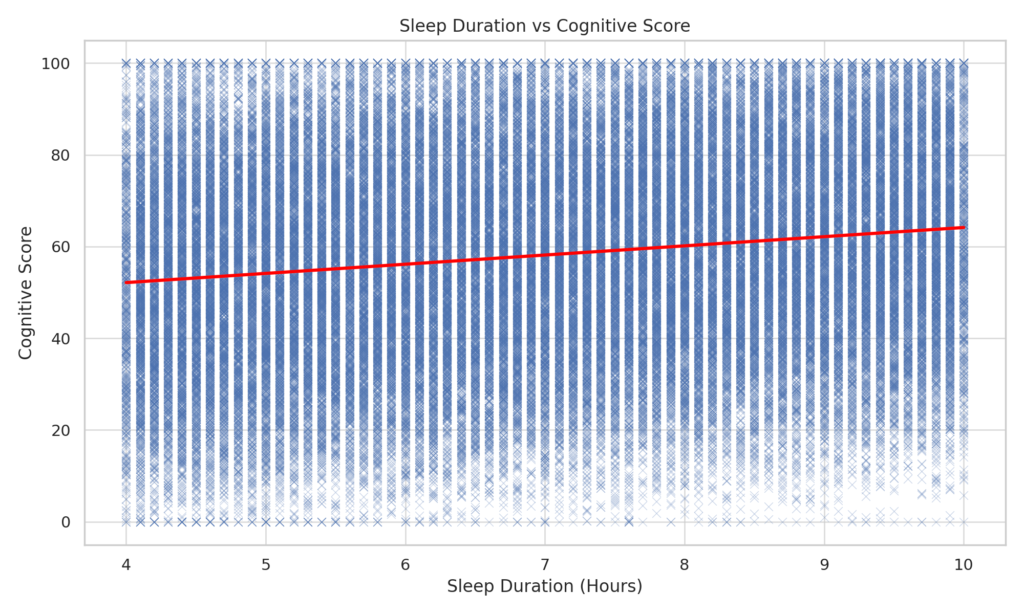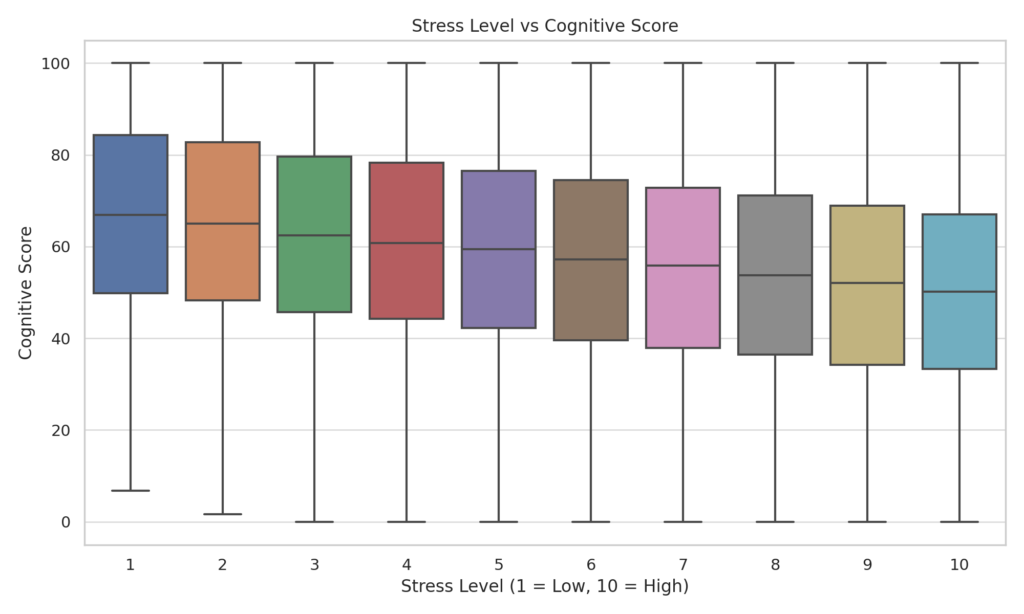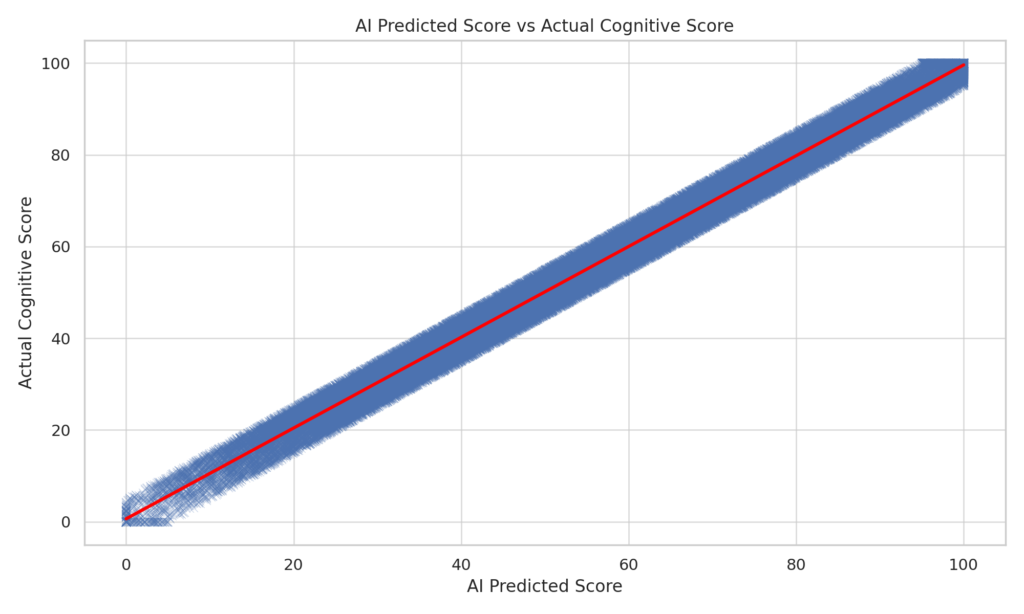In an age dominated by digital distractions and chronic stress, understanding the factors that influence our mental sharpness is more important than ever. What lifestyle habits enhance our brain function? How do poor routines degrade it?
In this research-backed article, we explore a dataset of 80,000 individuals from the Human Cognitive Performance dataset on Kaggle to uncover how sleep, stress, exercise, caffeine, and screen time shape our reaction time, memory, and overall cognitive ability.
1. What Is Cognitive Performance?
Cognitive performance reflects how effectively our brain processes information, solves problems, and adapts to challenges. It’s not just about IQ; it’s about day-to-day mental function—how quickly we think, how well we remember, and how effectively we make decisions.
In this study, we analyze three primary measures:
- Reaction Time (ms): How quickly an individual responds to stimuli.
- Memory Test Score (0–100): A score based on short-term recall and accuracy.
- Cognitive Score (0–100): A composite score representing overall cognitive ability.
These metrics are influenced by a range of behavioral and lifestyle inputs, such as diet, sleep, screen time, and stress levels.
2. How Smart Are We? A Look at the Score Distribution
We begin by examining the distribution of cognitive scores across the sample. Most individuals fall within a bell-shaped curve, peaking near a score of 50. While a small number score below 30 or above 80, the majority cluster between 40 and 70.
📊 Visual: “Distribution of Cognitive Scores”

This suggests a standard range of cognitive performance among adults, with meaningful variability that could be linked to personal habits and wellness factors.
3. The Sleep Factor: Quantity and Quality Matter
Sleep is vital to brain function—it affects memory, emotional regulation, focus, and creativity. In our analysis, we observe that the highest cognitive scores are associated with 7 to 8 hours of sleep per night.
📊 Visual: “Sleep Duration vs Cognitive Score”

Interestingly, both insufficient sleep (under 6 hours) and excessive sleep (over 9.5 hours) correlate with lower cognitive scores. This aligns with findings in neuroscience, where too little sleep leads to poor synaptic restoration, and too much sleep is often a marker of underlying health issues.
This U-shaped relationship supports the idea that it’s not just about more sleep—it’s about optimal sleep.
4. Stress and the Brain: A High Price to Pay
Stress activates the body’s fight-or-flight system. While helpful in short bursts, chronic stress can impair cognitive flexibility, reduce memory function, and disrupt emotional regulation.
📊 Visual: “Stress Level vs Cognitive Score”

Our data shows a clear and consistent drop in cognitive scores as stress levels increase. Those with stress levels above 8 out of 10 scored significantly lower, with narrower score ranges—suggesting not only diminished performance but also fewer cognitive outliers in high-stress populations.
This supports a large body of psychological research showing that stress hormones like cortisol have a direct negative effect on hippocampal function and working memory.
5. Exercise: Fuel for the Body and the Brain
Physical activity doesn’t just benefit your muscles—it supercharges your brain. Regular exercise has been shown to increase neurogenesis (growth of new brain cells), improve executive function, and reduce inflammation.
📊 Visual: “Exercise Frequency vs Cognitive Score”

Our dataset confirms that those who exercise regularly—especially at “High” frequency—tend to score significantly higher on cognitive metrics. Even “Medium” levels of physical activity provide noticeable mental benefits over sedentary lifestyles.
This suggests that you don’t need to be a marathon runner to gain cognitive advantages; moderate, consistent movement is enough to make a meaningful difference.
6. Can Machines Measure the Mind? AI Predictions vs Reality
One of the dataset’s most interesting features is its inclusion of an AI-predicted cognitive score based on behavioral and lifestyle inputs.
📊 Visual: “AI Predicted Score vs Actual Cognitive Score”

When comparing predicted vs actual scores, we observe a strong linear correlation—showing that machine learning models can effectively estimate cognitive ability from data inputs like screen time, caffeine intake, and sleep patterns.
The predictive power of AI in cognitive assessment raises exciting possibilities in both education and mental health. With consent and transparency, such models could help detect early signs of cognitive decline or burnout.
7. Additional Insights: Diet, Screen Time, and Caffeine
Beyond the major variables above, several secondary lifestyle habits also correlate with cognitive performance:
- Screen Time: Individuals with over 9 hours of screen time per day showed slightly lower average cognitive scores, likely due to reduced physical activity and disrupted sleep.
- Caffeine Intake: Moderate caffeine users (50–200mg/day) performed slightly better than both low and excessive consumers—supporting the idea that caffeine boosts alertness when used responsibly.
- Diet Type: Vegetarians showed marginally better memory scores than non-vegetarians. However, differences in overall cognitive scores were not statistically significant.
These secondary findings are worth exploring further with targeted research.
8. Conclusion: What This Means for You
Our analysis of 80,000 individuals confirms what many health experts have long suggested: your brain health is shaped by your daily choices. The most cognitively resilient individuals tend to:
- Sleep 7–8 hours per night
- Maintain low to moderate stress levels
- Engage in regular physical activity
- Use caffeine moderately
- Limit excessive screen exposure
Additionally, the strong alignment between AI predictions and actual cognitive outcomes indicates that data-driven brain health monitoring may soon become the norm.
In a world where mental performance is increasingly tied to productivity, wellbeing, and quality of life, these insights offer a roadmap to sharpening the most valuable tool we have—our minds.
📊 Data Source: Kaggle: Human Cognitive Performance Dataset